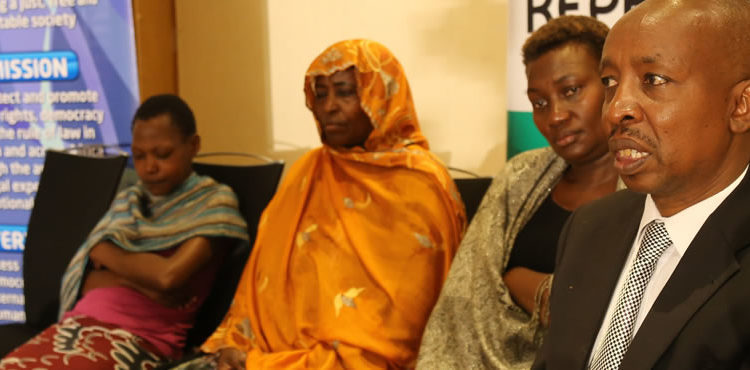A section of the victims and survivors of various violations led by National Victims and Survivor’s Network coordinator Wachira Waheire during a past stakeholders dialogue on the adoption and implementation of the TJRC Report in 2014.
By Journalists For Justice
Longstanding land grievances have created a hostile political environment for concluding Kenya’sTruth, Justice and Reconciliation process, according to a section of Members of Parliament.
“It is like we are trying to legislate in a 1963 parliament,” says Wajir North MP Ibrahim Abdi Saney about the Truth Justice and Reconciliation Commission report.
“The state has no regard for the 2010 Constitution. It absolutely contradicts the Bill of Rights and the spirit of the constitution. I don’t think the TJRC report in its original form, could have assisted in truth and reconciliation. At the rate in which it is being mutilated, it will not see the light of day,” he added.
Audio: Wajir North MP Ibrahim Abdi Saney
Fears of prosecution for some of the individuals named, as well as recommendations for the repossession and restitution of irregularly acquired land present some of the biggest obstacles to implementing the TJRC report, which was handed over to the President in May 2013 and formally presented to the National Assembly for debate in August 2013.
Last year, the President and the Chief Justice, Willy Mutunga, issued formal apologies for the role of the Executive and the Judiciary in perpetrating and not punishing human rights violations as recommended in the report. Additionally, the President announced the establishment of a Sh10 billion restorative justice fund but without parliamentary action on the report, his proposals remain without a policy or legal basis.
“No no single cent of the Sh10 Billion restorative justice fund set aside has been spent on survivors because of the lack of a clear policy or legal provision to enforce it,” said Christine Alai, the country coordinator for Physicians for Human Rights.
Molo MP Jacob Macharia, whose constituency has a large number of survivors of human rights violations, was more circumspect: “The land issues are to be carefully handled by the government. Land is a very emotive issue, but parliament has not refused per se. once we have developed a formula on how land will be distributed, we will have no issue of implementing the TJRC report and the issues of the Sh10 billion restorative justice fund.”
“In as much as we are talking of past injustices, the same state continues to perpetrate injustices. The same state does not want to address past underlying causes of injustices. It does not want to address the same issues the TJRC commission addressed,” Macharia added.
Audio: Molo MP Jacob Macharia on restorative justice
Ken Okoth, Mp Kibra, “We will not forget the victims; once the report comes for debate we shall handle it. We can all agree the pain and frustrations of the victims who had the courage to come before us to share their stories.”
Civil society organisations were raising the alarm that if the truth, justice and reconciliation commission process was not concluded, the country would not escape from the cycle of violence that characterizes elections. Alai added that if the underlying issues remained unaddressed victims would continue to suffer.
“Today we are speaking about a process, but at the heart of this process are lives, families, communities who continue to bear the brunt of the suffering and violations communities five years, ten years and twenty years ago,” she said.
Some of the TJRC recommendations include prosecution for individuals alleged to have perpetrated the violations and reparations – monetary, medical and psychosocial support — recognition and registration of community land, resettlement of displaced persons, expunging criminal records, establishment of implementation committee by legislation and the establishment of reparations fund. The recommendations sought to ensure that no violations ever recur.
“What is at stake are the Kenyan individuals who are yet to get closure if the report is not implemented. Posed a risk to the country’s stability.
“What the process was seeking to do was to help us understand the root causes of historical injustices and address them. Today, we are gearing up for another General Election, in 2017. We are carrying this trauma; survivors, communities remain with scars; tensions that have divided us as a society remain unaddressed, and there is a significant possibility that we could face a renewed cycle of violence next year or in the future.”
Chris Gitari, who heads the Kenya office of the International Centre for Transitional Justice, said the TJRC Report provides an opportunity to bring healing to Kenya.
“There is hunger of resolving past injustices in Kenya. Violating of rights is part of our Kenyan culture. We need to break it. We have systematically failed to consistently investigate and punish perpetrators of human rights violations. We have created a culture of tolerating human rights violations.”
The TJRC was established by an act of parliament in 2008 to investigate serious human rights violations and other injustices dating from December 1963 to February 2008. The commission’s final report was published in the government’s Kenya Gazette on June 7.
Read also:jfjustice.net/en/complementarity/for-reparations-sorry-just-is-not-enough







